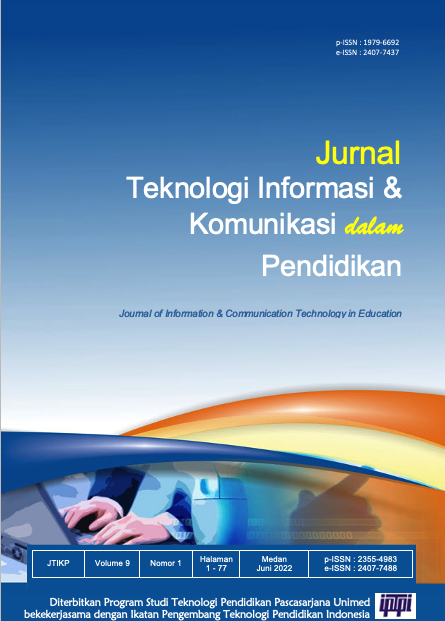PENGEMBANGAN MODUL PEMBELAJARAN BERBASIS SOFTWARE SIMULASI NI MULTISIM PADA MATA KULIAH RANGKAIAN LISTRIK DC
DOI:
https://doi.org/10.24114/jtikp.v9i1.35478Abstract
Abstrak : Penelitian pengembangan ini bertujuan untuk mengembangkan sebuah produk pembelajaran berupa modul pembelajaran berbassi Software simulasi Ni Multisim pada mata kuliah rangkaian listrik DC. Pengembangan modul ini bertujuan untuk menyediakan alternatif media pembelajaran yang dapat memfasilitasi mahasiswa untuk belajar secara aktif, kreatif dan mandiri tanpa adanya keterbatasan ruang, waktu ataupun adanya pendidik. Metode yagn digunakan dalam peneltian ini adalah metode Research and Development (R & D) serta model pengembangan yang digunakan yaitu model 4-D (Define, Design, Develop and Disseminate). Dalam penelitian ini, tekni analisis data yang digunakan yaitu teknik analisis deskriptif yaitu mendeskripsikan tingkat validitas serta tingkat kemudahan dan keterbacaan modul. Hasil penelitian dan pengembangan ini yaitu: validitasi modul pembelajaran dinyatakan valid pada aspek materi/ isi, aspek penyajian dan format, serta dari hasil ujiketerbcaan modu, didapatkan hasil bahwa modul pembelajaran yang dikembangkan mudah untuk dipahami sehingga layak digunakan sebagai alternatif media pembelajaran mandiri. Kata Kunci: Modul Pembelajaran, Validitas, Uji Keterbacaan, Model 4-D Abstract : This development research aims to develop a learning product in the form of a learning module based on the Ni Multisim simulation software in the DC electric circuit course. The development of this module aims to provide alternative learning media that can facilitate students to learn actively, creatively and independently without the limitations of space, time or the presence of educators. The method used in this research is the Research and Development (R & D) method and the development model used is 4-D Model (Define, Design, Develop and Disseminate). In this study, the data analysis technique used is descriptive analysis technique, which describes the level of validity and the level of ease and readability of the module. The results of this research and development are: the validity of the learning module is declared valid in the material/content aspect, presentation and format aspect, and from the module readability test results, it is found that the learning module developed is easy to understand so it is suitable to be used as an alternative independent learning media. Keywords: Learning Module, Validity, Readability Test, 4-D ModelReferences
Anderson W, Lorin dan Krathwohl R, David. (2001). A taxonomi for Learning, teaching and Asessing. A Revision of Bloom™s Taxonomy of Educational Objectives. USA: Addison Weasley Longman
Asmani, J. M. (2011). Tips Efektif Pemanfaatan Teknologi Informasi dan Komunikasi dalam Dunia Pendidikan. Yogyakarta: Diva Press
Prastawo, Andi. (2012). Panduan Kreatif Membuat Bahan Ajar Inovatif: Menciptakan Metode Pembelajaran yang menarik dan Menyenagkan. Yogyakarta: Diva Press
Rusman, dkk. (2011). Pembelajaran Berbasis Teknologi Informasi dan Komunikasi. Jakarta: Rajawali Press
Russel, James.D. (1994). Modulator Instructional System. New York: Nichol Publisher Company
Smaldino, Sharon E, dkk. (2012). Instructional Technology and Media for Learning, Ninth edition. New Jersey Columbus, Ohio: Pearson Merrill Prentice Hall
Sudjana, Djuju. (2000). Evaluasi Program Pendidikan Luar Sekolah. Bandung: Remaja Rosdakarya
Sudjana, Nana dan Rivai, A. (1997). Media Pengajaran. Bandung: Sinar Baru Algensindo
Sugiono, (2014). Metode Penelitian Pendidikan Pendekatan Kuantitatif, Kualitatif dan R & D. Bandung: Alfabeta
Sukmadinata, N.S. (2007). Metode Penelitian Pendidikan. Bandung: Remaja Rosdakarya
Taber, K. S. (2009). Progressing Science Education, Constructing the Scientific Research Programme into the Contingent Nature of Learning Science. New York: Spinger Dordrecht Heidelberg.
Thiagarajan, Silvasailam, dkk. (1974). Instructional Development for Training Teachers of exceptional Children. Washinton DC: National Center for Improvement Educational System




